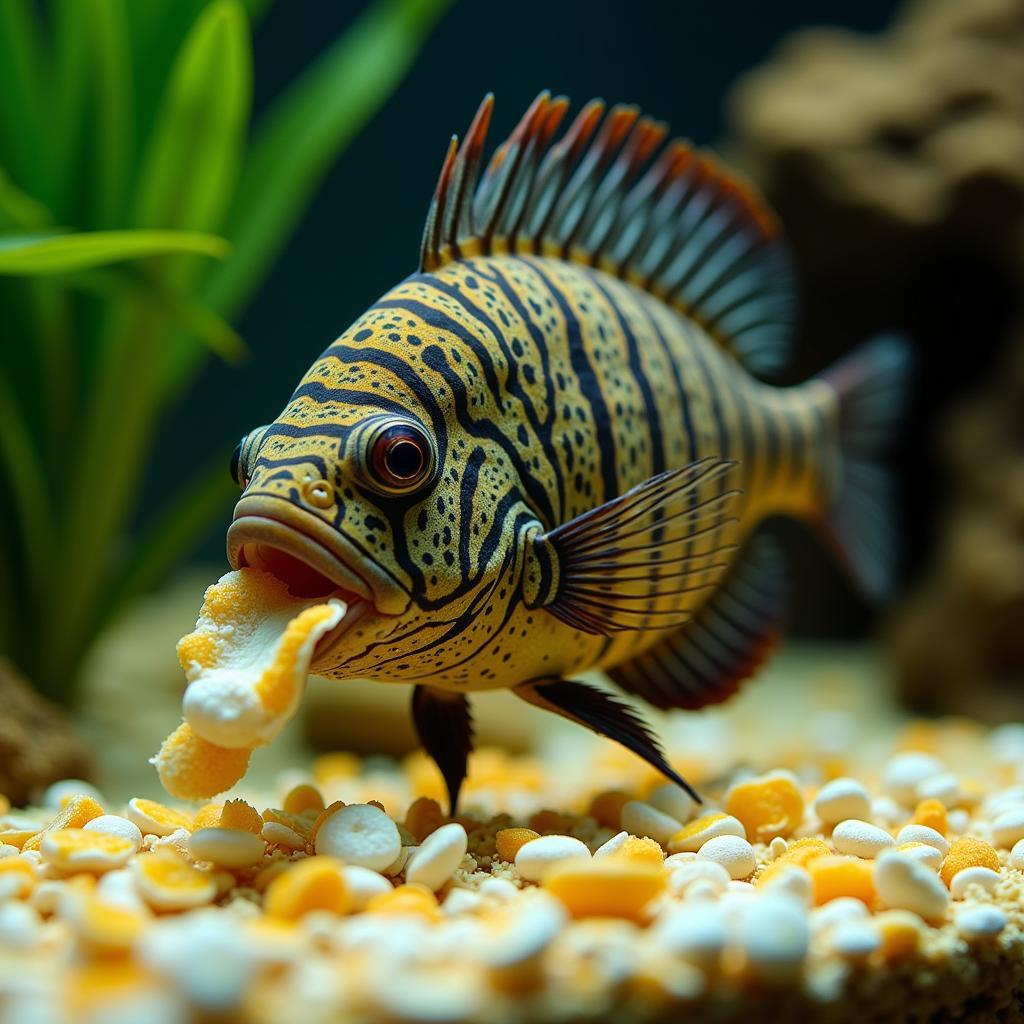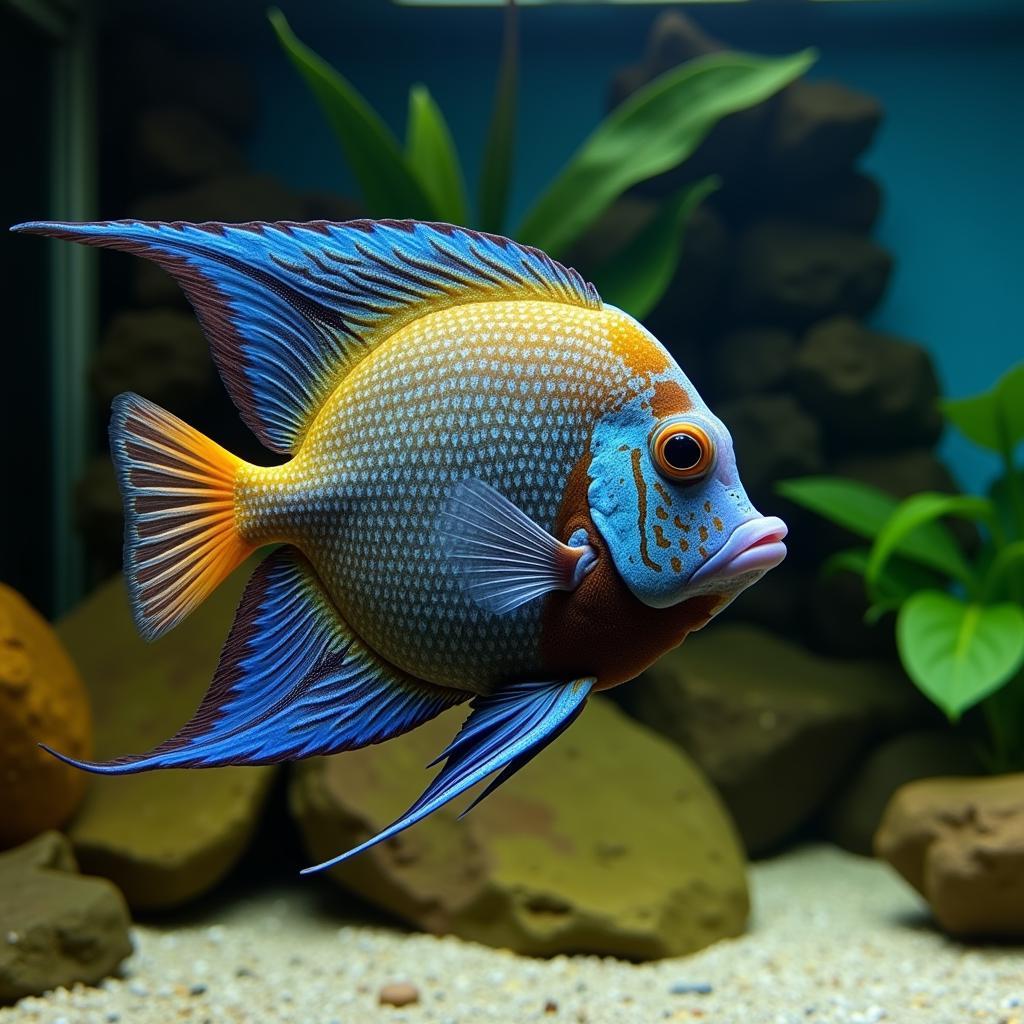The Ultimate Guide to the African Butterfly Fish Diet
The African butterfly fish, with its striking patterns and graceful movements, is a popular choice for aquarium enthusiasts. Understanding the African Butterfly Fish Diet is crucial for their health and longevity. This comprehensive guide delves into the intricacies of feeding these fascinating creatures, ensuring they thrive in your care.
What Do African Butterfly Fish Eat in the Wild?
In their natural habitat, African butterfly fish are primarily insectivores. Their diet consists mainly of insects that land on the water’s surface, as well as larvae, small crustaceans, and zooplankton. They are surface feeders, uniquely adapted to snatch prey from above. This specialized diet has shaped their evolutionary path, resulting in their distinctive upturned mouth.
Do you want to learn more about caring for African cichlids in general? Check out this african cichlid care guide.
Replicating the African Butterfly Fish Diet in Your Aquarium
Recreating a natural diet for your African butterfly fish is essential for their well-being. While they can adapt to a variety of foods in captivity, a diet rich in protein is key.
Essential Food Sources for African Butterfly Fish
-
Live Foods: Live foods are the cornerstone of a healthy african butterfly fish diet. Offer a variety of options such as bloodworms, daphnia, brine shrimp, and fruit flies. These foods mimic their natural prey and provide essential nutrients.
-
Frozen Foods: Frozen versions of the live foods mentioned above are a convenient alternative. Ensure they are thawed completely before feeding.
-
Dry Foods: High-quality flake or pellet food designed specifically for insectivorous fish can supplement the diet. Look for options with high protein content.
 African Butterfly Fish Eating Flakes
African Butterfly Fish Eating Flakes
What about the age when African cichlids can breed? You can find out more about african cichlid breeding age.
Feeding Frequency and Quantity
Feed your African butterfly fish small amounts several times a day. Overfeeding can lead to water quality issues, so observe their eating habits and adjust portions accordingly. It’s better to underfeed than overfeed.
Variety is the Spice of Life (and a Healthy Diet)
Just like humans, African butterfly fish benefit from a varied diet. Offering different types of food ensures they receive a balanced intake of nutrients, promoting optimal health and vibrant coloration.
Are you interested in purchasing African butterfly cichlids? You might want to check out this resource about african butterfly cichlid for sale.
Common Mistakes to Avoid
-
Overfeeding: As mentioned earlier, overfeeding can be detrimental to water quality and the fish’s health.
-
Feeding Inappropriate Foods: Avoid feeding foods that are not part of their natural diet, such as bottom-dwelling foods. They are surface feeders and won’t readily consume food at the bottom of the tank.
 Healthy African Butterfly Fish
Healthy African Butterfly Fish
“A varied diet rich in protein is crucial for the health and vibrancy of African butterfly fish,” says Dr. Abena Kwame, a renowned aquatic veterinarian. “Providing a mix of live, frozen, and high-quality dry foods will ensure they thrive.”
Conclusion
Providing a proper african butterfly fish diet is a key aspect of responsible fishkeeping. By understanding their natural feeding habits and replicating them in the aquarium, you can ensure your African butterfly fish live a long, healthy, and vibrant life. Remember to offer a varied diet, avoid overfeeding, and choose appropriate food types.
FAQs
- What is the ideal water temperature for African butterfly fish? The ideal temperature range is between 75-82°F (24-28°C).
- Are African butterfly fish aggressive? They are generally peaceful but can be territorial with their own kind.
- Can I keep African butterfly fish with other species? Yes, they can be kept with other peaceful, similarly-sized fish.
- How often should I change the water in my African butterfly fish tank? Partial water changes of 25-50% should be performed every 1-2 weeks.
- How can I tell if my African butterfly fish is healthy? A healthy fish will have vibrant colors, a good appetite, and active swimming behavior.
- What is the average lifespan of an African butterfly fish? With proper care, they can live for 5-8 years.
- Do African butterfly fish need a lot of space? A minimum tank size of 20 gallons is recommended.
Curious about the size of other African fish like the African brown knife? Check out information regarding african brown knife size. Or if you’re interested in insects as food, learn more about the african cricket insect.
When you need assistance, please contact us via Phone: +255768904061, Email: [email protected] or visit us at Mbarali DC Mawindi, Kangaga, Tanzania. Our customer service team is available 24/7.

